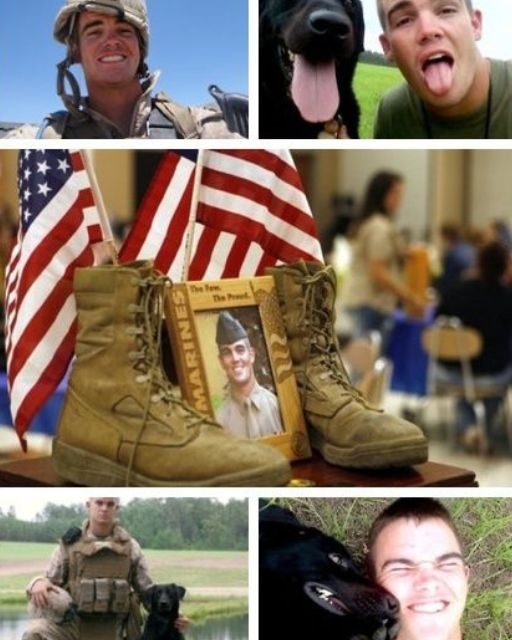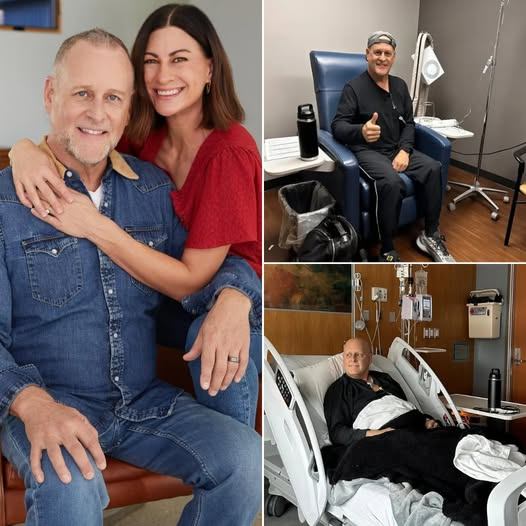
His full name was Staff Sergeant Jonathan Reese Mitchell, but everyone just called him Reese. “Staff Sergeant” made him sound like somebody’s dad. He was only 24.
Reese could make you laugh no matter the weather. He always took selfies with goofy faces and talked to his dog, Tank, like they were college roommates. In a way, they were. Tank went everywhere with Reese. A big black lab, trained for detection but treated like a baby. Tank wouldn’t take orders from anyone else—not even the CO.
I remember the day they left for their second tour. Reese handed me his watch and said, “Hold onto this. If it stops ticking, you’ll know I’m late for something.”
That damn thing is still ticking.
We got the news about Reese a week before Tank came back.
He arrived with another Marine, muzzle loose, tail low. I swear to God that dog knew. He walked straight into the memorial, sniffed Reese’s boots, and sat down in front of the photo—like he was waiting for someone to say, “Just kidding. He’s right behind you.”
But no one did.
The room was full but silent—until Tank let out this low, broken whine that made grown men lose it.
After the service, I went to get my coat and found something tucked inside the toe of Reese’s left boot.
It wasn’t military-issued.
It was a napkin. Folded twice. In his handwriting.
It read:
“Hey, buddy.
If you’re reading this, things didn’t go the way I planned. Tank did everything right, so don’t be mad at him. But I need a favor. Go to 147 Maple Street. Find Clara.
Tell her I kept my promise.”
I stared at those words so long the ink started to blur under my thumb. What did he mean? Who was Clara? And why write it on a napkin?
Maple Street wasn’t far from base. It was a quiet neighborhood where kids still rode bikes without helmets and old ladies waved from porches. Number 147 was a small yellow house with flower boxes full of petunias. My stomach twisted as I knocked on the door.
A young woman answered. Mid-twenties, maybe. Brown curly hair in a messy bun. She looked pretty—but tired, like she’d been through a lot and come out stronger. Her eyes widened slightly when she saw me.
“Were you friends with Reese?” she asked softly.
“How did you know?” I said, surprised.
She gave a small smile. “Your uniform. Your posture. You have the same energy he did.”
Hearing her say his name made me feel guilty for showing up unannounced. But before I could apologize, she stepped aside and motioned me in.
The living room was cozy, full of blankets, books, and framed photos. One stood out—Reese, younger, holding a golden retriever puppy and smiling wide.
“That’s—?” I began.
“Luna,” Clara said. “She passed away last year. Cancer.” She cleared her throat and kept going, even though her voice cracked. “Reese helped me through it. He’d come by with coffee and just sit with me while we talked about everything and nothing. He was… different.”
I handed her the napkin. Her hands trembled as she unfolded it. She cried as she read it.
“He said if anything ever happened to him, he’d find a way to check in on me,” she whispered. “He told me he owed me that much.”
“What did he owe you?” I asked gently.
Clara thought for a second, then reached for a small wooden box on the coffee table. Inside were dozens of letters, stacked neatly and tied with string. She picked one out and gave it to me.
It was dated three years ago.
That letter told nearly everything. Reese met Clara shortly after returning from his first deployment. She was grieving the death of her fiancé, who’d died in a car accident months earlier, and she worked at a nearby animal shelter. Tank’s leash had broken, and Reese came in to replace it. Somehow, they ended up talking for hours.
They weren’t lovers, not exactly, but they became incredibly close. Clara confided in him about her grief. Reese told her stories from overseas. They leaned on each other.
In one letter, Reese wrote:
“You taught me how to keep going when everything feels impossible. Clara, you’ve saved me more than once. Promise me, if something happens, don’t shut the world out. Promise me you’ll keep going.”
And Clara had written back:
“I promise—if you promise to come see me whenever you can. Deal?”
They made a deal. Reese always kept his word.
“So now what?” I asked Clara after reading the letters. “What do we do?”
She wiped her eyes and smiled softly. “I think he wants us to take care of each other. Not just for him—but for us. We made a promise too.”
I remembered what she said. The next day, I brought Tank to see Clara. At first, he wandered the yard, uncertain. But when Clara sat on the grass and patted her lap, he walked over and laid his head on her knee. It was the first time since Reese’s death that Tank looked at peace.
Over the following weeks, Clara and I grew closer. We started working together at the animal shelter, and Tank came with us to help the rescue dogs learn to trust people. Little by little, we began to heal. Not because Reese was gone—but because he taught us how to carry on.
A few months later, I got a letter in the mail. Inside was a rolled-up page and a photo. In the picture, Reese sat on a park bench, laughing, while Tank jumped into a pile of leaves. On the back, he’d written:
“Life is short. Laugh loud. Love more.”
The note said:
“Hey, pal. I hope Clara and Tank are okay. Just a reminder—things can still turn out all right, even if they don’t go according to plan. Keep making people laugh. Be brave. And don’t forget—you’re stronger than you think.”
Though Reese left too soon, his legacy lives on—in the laughter he sparked, the friendships he built, and the love he gave. His story reminds us that even in darkness, we can help each other find the light.
Because life doesn’t always give us happy endings—but it does give us the chance to create them. Every act of kindness matters. Keeping a promise. Helping a friend. Choosing to smile, even through pain.
Share this story with someone who needs a reminder that hope still exists—even when things feel broken. 💙



